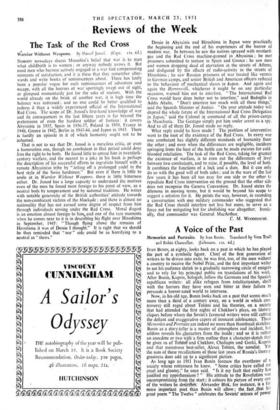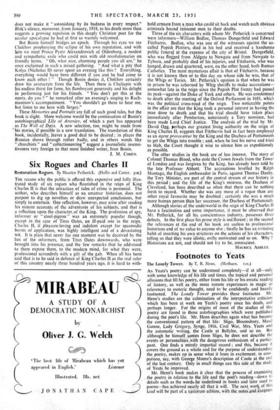A Voice of the Past
Memories and Portraits. By Ivan Bunin. Translated by Vera Traill and Robin Chancellor. (Lehmann. 1 as. 6d.) IVAN BUNIN, at eighty,.looks back on a past in which he has played the part of a symbolic figure. Chief of the first generation of writers to be driven into exile, he was first, too, of the men without a country to receive the Nobel Prize, and the first important writer to see his audience shrink to a gradually narrowing circle of emigres and to rely for his principal public on translations of his work. After Bunin, Kuprin, Sologub, follow the Germans and the Spanish republican writers: all alike refugees from totalitarianism, shrill with the horrors they have seen and bitter at their failure to persuade a horror-sated world to intervene. Now, in his old age, Bunin looks back on a past that seems much more than a third of a century away, on a world in which con- troversy still raged about Tolstoi and his theories, on a society that had attended the first nights of Chekhov's plays, on literary cliques before whom the Soviet's favoured writers were still cutting the defiant and exaggerative capers of innocent adolescence. These Memories and Portraits are indeed no more than thumbnail sketches. Bunin as a story-teller is a master of atmosphere and incident, but seldom reveals his .characters from the inside ; and so it is rather an anecdote or two ivith 'a firm outline than a.character-sketch that he gives us of TolStoT and Chekhov, Chaliapin and Gorki, Kuprin and that monstrous best-seller, Alexei Tolstoi, the novelist. Yet the sum of these recollections of those last years of Russia's literary greatness does add up to a significant picture. As long ago as 1911 Ivan Bunin foresaw the overthrow of a society whose rottenness he knew. " Some critics have called me cruel and gloomy," he once said. "Is it my fault that reality has justified my apprehensions ? " His attitude to the Revolution was uncompromising from the start ; it colours his picture of every one of the writers he describes. Alexander Blok, for instance, is a far more important poet than Bunin will allow-; the fact _that hrs great poem "The Twelve " celebrates the Soviets' seizure of power does not make it " astonishing by its badness in every respect." Blok's silence, moreover, from January, 1918, to his death more than suggests a growing repulsion in this deeply Christian poet for the secular apocalypse he had at first so warmly welcomed.
But Bunin himself bridges an epoch. Through his eyes we see Chekhov prophesying the eclipse of his own reputation, and with him we meet Prince Pyotr Alexandrovich of Oldenburg, a modest and sympathetic exile who could mix with old revolutionaries on friendly terms. " Oh, what nice, charming people you all are," he once exclaimed in such a mixed gathering. " And what a pity that Kolya (Nicholas II) never spent an evening like this ! Everything, everything would have been different if you and he had come to know each other ! " Though Bunin denies it, Chekhov certainly drew his aristocrats from the life. Then there is Chaliapin with his endless thirst for fame, his flamboyant generosity and his delight in performing just for his friends. " You don't get this at the opera, do you ? " he remarked after an evening's singing to Rach- maninov's accompaniment. " You shouldn't go there to hear me, but listen to me here with Sergey."
These Memories and Portraits are full of such good tales, but the book is slight. More welcome would be the continuation of Bunin's autobiographical Life of Arseniev, of which a part has appeared as The Well of Days. A new selection, too, might be made from his stories, if possible in a new translation. The translation of this book. incidentally, leaves a good deal to be desired ; in places the Russian shows through rather badly, and in others words like " churchists " and " collectioneering " suggest a journalistic insensi- tiveness very foreign to that most finished writer, Ivan Bunin.
J. M. COHEN.



































 Previous page
Previous page